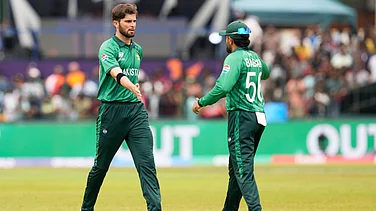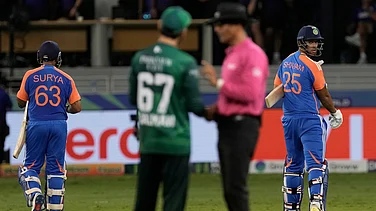Clearly, somebody will have to carry the can for the big faux pas, but who? Sidhu himself says he decided to call it quits on "grounds divorced from cricket". So, is the legendary offspinner E.A.S. Prasanna right in saying that Sandeep Patil is too young for the job, and an older manager would have handled the situation better?
There are no easy answers here. But with people like Kapil and Scindia hinting at the way the sanctity of the dressing room and team coach has come down dramatically, it's certain some uncomfortable questions will have to be answered by Patil, especially since Sidhu hails from Punjab, board chief Bindra's home-state.
Before leaving for Singapore for the Singer Cup, when asked if he would allow wives to join players, Patil had told Outlook: "I believe the more relaxed the atmosphere, the better the performance that can be got out of the boys. I'll have a code of conduct like Wadekar did, but not one that treats them like kids."
Even if Patil has to pay the price for it, Azhar too will face the heat. With Kapil first, then Prabhakar, and now Sidhu leaving after acrimonious exchanges with the captain, Azhar will have to answer Mohinder Amarnath's query: "Why does it happen only to cricketers from the North? Why was Sidhu singled out when others were performing poorly, too?"
One reason is Sidhu himself. Although the seniormost in the side, he has long suffered under the weight of his success, says cricket writer Hemant Kenkre. With an above-40 average in both Tests and one-dayers, his fear of failure has had him playing well or not at all. And so, he has regularly reported unfit.
This has often given a long lever to those who wanted to keep him out. Signs that all was not well between Sidhu and Azhar, and possibly then manager Ajit Wadekar, surfaced when Sidhu was left out of the World Cup side against Australia in Bombay although he had been middling the ball and fielding competently in the nets.
Confirmation came a couple of matches later when he was left out of the Delhi match against Sri Lanka. Says Manoj Prabhakar, whose career ended with that tie: "They asked him to sit out, put on the sweater, and tell whoever asked that he was unwell and unfit to play." Sidhu was ready to call it quits that day but was dissuaded by Kapil Dev.
Returning for the crunch quarter-final in Bangalore against Pakistan, Sidhu scored a solid 97, and Azhar, many thought, would have realised Sidhu's utility to the team. It was not to be. Towards the end of that innings as the cramps got painful, Sidhu had to be given a runner, and the team management (comprising captain, vice-captain and manager) sent in Javagal Srinath whose ability to get run out equals, if not betters, Sanjay Manjrekar's.
The knock fetched Sidhu the Man of the Match award but Azhar said his choice would have been Ajay Jadeja who demolished Waqar Younis. Worse, Azhar said he wasn't sure if Sidhu would be in the squad for the semis: "I don't know what is wrong with him. If it's not his leg, it's his hand."
Little wonder then that Sidhu admits that his decision is based on "grounds divorced from cricket" and a number of former cricketers including Kapil and Prasanna share former pace bowler Karsan Ghavri's sentiment that "something mysterious is going on and it has surfaced with Sidhu's exit."
The dynamics of the Indian dressing room has changed in the past two years. There is no common yardstick, and the bias is showing. Says Prabhakar: "The atmosphere is stifling, shameful. Everybody is jealous of everybody else's performance especially if he doesn't belong to the captain's charmed circle."
That Sidhu wasn't. Although man-management was not one of his skills, Azhar, the first long-duration captain from the south, had found himself distinctly uncomfortable with players from the north and west after the disastrous South African tour. He would glare at Salil Ankola when the Bombay medium-pacer let a ball slip through his fingers while Srinath, equally butter-fingered but a far better bowler, would be spared. At post-match conferences, Azhar would wail about having four-five players who he couldn't hide on the field: Sidhu was always one of them.
At 32, as Navjot Singh Sidhu thinks of a new career, he must have ruled out journalism already. Two years ago when Javed Miandad was shown the door like him, a columnist wrote: "It's terrible the way (he) left the team. Maybe, the board wanted to try youngsters in his place. But the least they could have done was to tell him in advance so that he could have made his plans to retire public." The columnist? Well, one Mohammed Azharuddin.






















